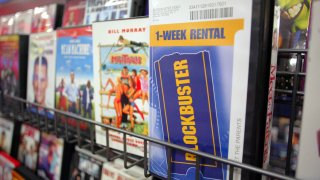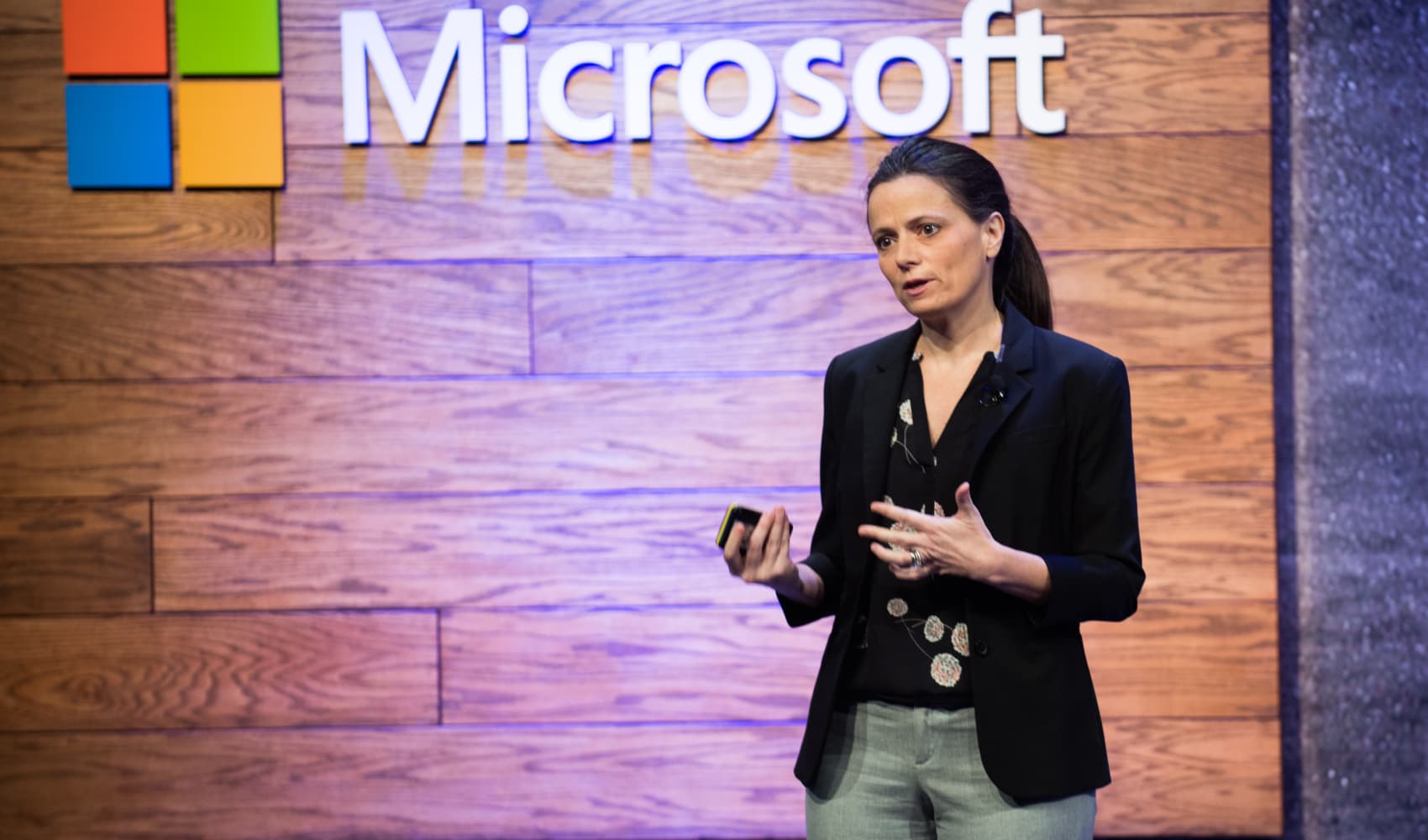
Ten years after Blockbuster filed for bankruptcy, the demise of the one-time movie rental giant has become the stuff of legend.
The popular narrative typically casts Blockbuster as a lumbering, old giant with an outdated business model that was taken down by the upstart Netflix, a spritely tech start-up with the revolutionary foresight to see that the future of home entertainment was all online. Movie over. Cue the end credits and nostalgic news coverage of the world's last brick-and-mortar Blockbuster store (it's in Bend, Oregon).
But the truth is far from being so simple.
It's a topic that comes up in a recent episode of ReCode's podcast "Land of the Giants: The Netflix Effect," in which tech journalists Peter Kafka and Rani Molla discuss the fact that "Blockbuster … should have squashed Netflix." What happened instead was not so much that Netflix actually killed Blockbuster, but really that "Blockbuster killed Blockbuster," Kafka says on the podcast.
It may still be fair to see Netflix as the tech industry's David, laying waste to massive Blockbuster's Goliath. But it's also true that Dallas-based Blockbuster, which boasted 9,000 locations and $6 billion in annual revenue at the height of its powers, also dropped the ball — big time — despite seemingly having Netflix on the ropes only a few years before going bankrupt.
Blockbuster laughed off Netflix
Blockbuster actually had plenty of chances to fend off Netflix's advances long before the tech start-up became the $213 billion Oscar- and Emmy-winning streaming behemoth it is today.
Money Report
In fact, Marc Randolph, who served as Netflix's first CEO (until 1999) after co-founding the company with current CEO Reed Hastings, tells CNBC Make It that many people do not realize "how close Blockbuster came to actually winning."
First of all, Blockbuster turned down a golden opportunity to end its rivalry with Netflix early in the game when Randolph and Hastings offered to sell Netflix to the video rental giant in 2000 for just $50 million. Instead of taking that offer, in which Hastings said that Netflix would essentially become Blockbuster's online business, Blockbuster basically "laughed us out of their office," former Netflix chief financial officer Barry McCarthy said in a 2008 interview.
Instead of making a deal, Randolph and Hastings left that meeting determined to knock Blockbuster off its perch.
Randolph admits that, at the time, big, well-established Blockbuster really held "almost all of the cards" in that negotiation. However Netflix did have a few advantages: "To start, everyone hated Blockbuster," Randolph wrote in his 2019 book about the founding of Netflix, called "That Will Never Work." Many customers were fed up with aspects of Blockbuster's business model. For instance, in 2000, Blockbuster collected $800 million in late fees from customers.
In fact, Netflix's early success in adding subscribers hinged on luring away Blockbuster customers who were tired of being charged a dollar a day for late returns. (Hastings has even said he had the idea to start Netflix because he was irked by paying $40 in Blockbuster late fees.) Netflix offered DVD rentals by mail and at a flat rate with no late fees.
As a result, Netflix topped 1 million subscribers within three years of being rebuffed by Blockbuster, and 6 million by the end of 2006.
Blockbuster makes up ground
Eventually, Blockbuster and CEO Antioco realized that Netflix was onto something. In 2004, a year in which Netflix's annual revenue hit $500 million, Blockbuster debuted its own online DVD subscription service, called Blockbuster Online. In a call with Wall Street analysts at the time, Netflix's Hastings said that Blockbuster and Antioco had "thrown everything but the kitchen sink at us." (Not long after, Antioco sent a package containing an actual kitchen sink to Hastings.)
Blockbuster Online quickly added over 1 million subscribers less than a year after launching, and then succeeded in hitting its online goals by reaching 2 million subscribers by the end of 2006. It was still trailing Netflix in overall online subscribers, but Blockbuster was picking up steam, even adding online subscribers just as quickly as the fast-growing Netflix.
In 2006, Blockbuster launched Blockbuster Total Access, which allowed online subscribers to return DVDs to Blockbuster's brick-and-mortar locations and exchange them for another DVD for free. That move added a wrinkle to Blockbuster's plan that Netflix could never match, and it finally seemed as if Blockbuster might be able to put Netflix on the ropes. In one quarter of 2007, Netflix even lost 55,000 subscribers compared to the previous quarter, while Blockbuster's subscriber base continued its growth.
Netflix co-founder Randolph, who left the company in 2003, tells CNBC Make It that things got "very scary" for Netflix once Blockbuster finally put serious resources toward its digital business, mustering "the true strength that they could [and] that we couldn't match, which was a blended model of online and stores."
"They were hurting us, and they were making tremendous gains," Randolph says.
Given Blockbuster's financial might compared to Netflix, it's not hard to imagine an alternate reality where Blockbuster continued to grow its online business and eventually wrote Netflix out of the history books.
Blockbuster's demise
Obviously, that's not what happened. A few different factors contributed to Blockbuster eventual demise.
First of all, Blockbuster was already carrying roughly $1 billion in debt when the company launched its online business, as its former parent company, Viacom, saddled its subsidiary with debt while spinning off Blockbuster into its own public company in 2004.
The debt was an especially big problem for Blockbuster, because launching its online subscription business was expensive. For instance, every time a Blockbuster customer actually exchanged a DVD at one of its stores through the Total Access plan, Blockbuster lost about $2. The idea was that Blockbuster would eventually add enough subscribers to make Total Access profitable. (Netflix faced similar obstacles, which is why the company took over six years to post its first profit and why it continues to burn through billions of dollars each year while adding new streaming content to grow its subscriber base.)
Blockbuster's debt rankled shareholders, especially with Blockbuster plowing roughly $200 million into an online business that was not yet profitable while also losing out on hundreds of millions of dollars in late fees.
"If it hadn't been for their debt, they could have killed us," Netflix's Hastings told reporter Gina Keating about Blockbuster in 2009.
The other thing that got in the way of Blockbuster squashing Netflix was Wall Street billionaire and activist investor Carl Icahn. By 2005, Icahn had acquired a nearly 10% stake in Blockbuster, large enough to entitle him to three seats on the company's board, where he immediately began battling Antioco for control of the company in an attempt to quickly boost its stock price.
Icahn and the other board members he installed vehemently opposed Antioco's plans to build out Blockbuster's online business and, especially, the decision to ditch the company's lucrative late fees. They didn't seem to grasp the importance of building a strong digital presence to the future of Blockbuster's industry.
In the end, though, Blockbuster's ultimate demise might have come down to an argument between Antioco and Icahn over the CEO's bonus. After a strong year in 2006, Antioco was due an annual bonus of more than $7.6 million, which Icahn felt was exorbitant. Icahn began pushing for Antioco's ouster, and the CEO agreed to step away in March 2007.
Antioco accepted a roughly $3 million bonus, plus an additional buyout of almost $5 million, to walk away from Blockbuster, leaving Icahn free to install a CEO he supported. That CEO was James Keyes, who had previously been CEO of 7-Eleven but had little experience building a digital business.
Icahn and Keyes wanted Blockbuster to focus on growing its revenue to pay off its debt, which they believed meant turning the company's focus away from the online business and reinvesting in brick-and-mortar stores. Under Keyes, the company even reinstated its unpopular late fees in 2010.
Blockbuster's online subscription business sputtered and the company was suddenly faced with an even larger obstacle than Netflix: the 2008 financial crisis that led to the Great Recession. The financial crisis made it a scary time to be carrying so much debt, especially since banks were no longer as willing to lend additional money.
For his part, Keyes later blamed Blockbuster's ultimate demise on the company's inability to raise Wall Street financing to pay off its debt. "That was the death blow to Blockbuster that caused us to have to file for bankruptcy," Keyes said in 2018.
By 2010, Blockbuster was forced to file for bankruptcy after still being unable to pay off its roughly $1 billion in debt six years after the spin-off from Viacom.
That same year, Netflix hit 20 million subscribers and started expanding overseas.
"I firmly believe that if our online strategy had not been essentially abandoned, Blockbuster Online would have 10 million subscribers today, and we'd be rivaling Netflix for the leadership position in the internet downloading business," Antioco wrote in a 2011 essay for Harvard Business Review.
Today, Netflix boasts more than 183 million global subscribers and the tech company brought in over $20 billion in revenue in 2019.
Antioco sold his shares in Blockbuster upon leaving the company in 2007 and, instead, invested that money in Netflix, which was then priced "around $20" per share, he writes in the essay.
"I could see that Netflix was going to have the whole DVD-by-mail market handed to it, along with a direct path to streaming movies into homes—which is exactly what Netflix has done. I thought I was a genius when I sold my shares at about $35. Today they're over $200."
That was in 2011. Now, Netflix shares are worth nearly $485 apiece.
(And despite its success with streaming, Netflix still boasts more than two million subscribers who pay to have DVD's mailed to their homes, a business that brought in nearly $300 million in revenue in 2019.)
Randolph calls Icahn's activist push at Blockbuster something of a "deus ex machina" that rescued Netflix just as Blockbuster had "finally mounted a truly legitimate and sustainable challenge."
Meanwhile, Icahn has called his activist role at Blockbuster "the worst investment I ever made" in his own 2011 Harvard Business Review essay, a rebuttal to Antioco's. Icahn blamed Blockbuster's debt and "changes in the industry" for the company's demise, though he also admitted that the Blockbuster board might have erred in replacing Antioco with Keyes. Icahn also complimented the job Antioco had done in building Blockbuster Total Access, which the billionaire investor said "might have helped Blockbuster fend off Netflix" eventually.
"To this day I don't know what would have happened if we'd avoided the big blowup over Antioco's bonus and he'd continued growing Total Access," Icahn wrote. "Things might have turned out differently."
— Additional reporting by Jade Scipioni
Check out: The best credit cards of 2021 could earn you over $1,000 in 5 years
Don't miss:
How Aldi's frugal, reclusive founders turned a corner grocery store into a $38 billion fortune






